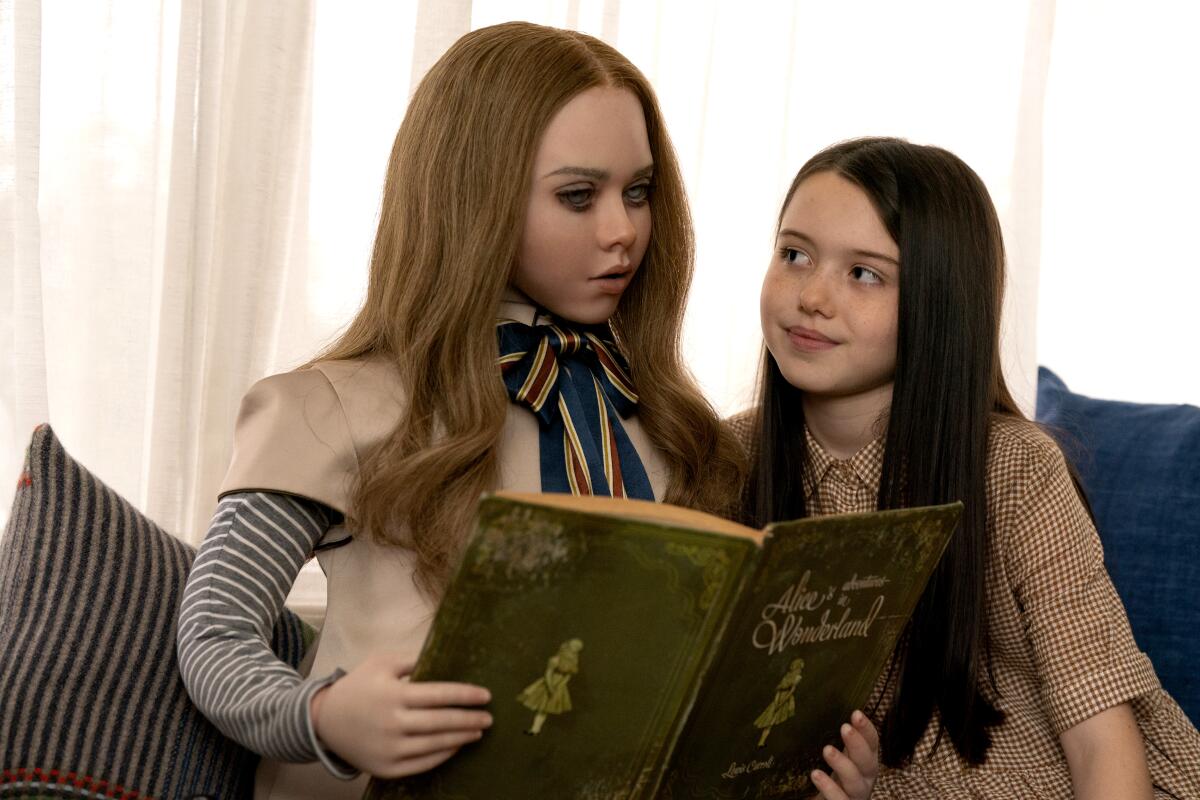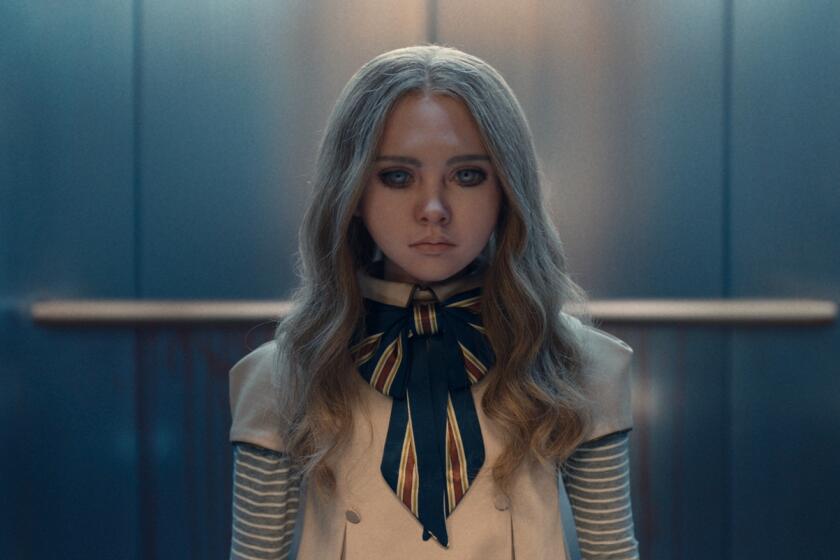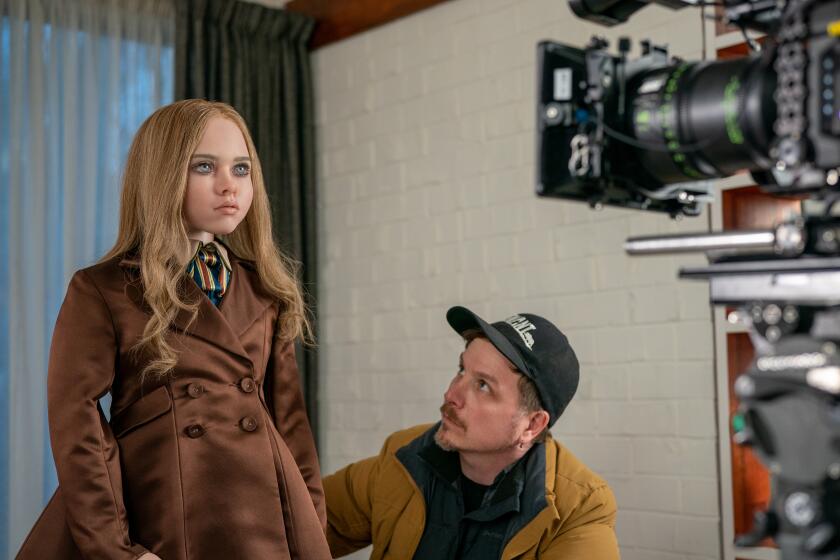How ‘M3GAN’ turned a 10-year-old David Guetta and Sia hit into spooky murder-doll music

- Share via
M3GAN — the titular, murderous robotic star of the decade’s buzziest horror film — is a villain tailor-made for these modern times.
In the film, devised by writers Akela Cooper and James Wan, a tween-sized robot named M3GAN — an acronym for “Model 3 Generative Android” — is created by a roboticist (played by Allison Williams) to be a companion to her newly orphaned niece, Cady (played by Violet McGraw).
In the movie trailer, M3GAN flaunts her killer (sorry) dance moves, which are modeled after everyday TikTok challenges. In the weeks leading up to the film’s Jan. 6 release, M3GAN cosplayers executed her strange choreography in some brilliant TikToks (and flash mobs) of their own.

But in theaters across the United States this week, audiences discovered in real time that M3GAN not only danced — she could sing. Voiced impeccably by the 18-year-old YouTube star Jenna Davis, the tween doll transforms “Titanium,” David Guetta and Sia’s 2011 techno-pop hit, into a menacing minute-long lullaby. (“You shoot me down, but I won’t fall,” she warbles as the camera hones in on her glassy eyes: “I am titanium!”) Inside a theater in Glendale, the scene cued incredulous laughter from the audience.
Since then, “Titanium” (M3GAN’s Version) has exploded on TikTok, counting more than 4 million plays across the platform. Meanwhile, the original Guetta/Sia track has generated 2 million YouTube views in the first three days since the film’s release.
With ‘Malignant,’ ‘M3GAN’ and ‘The Nun 2,’ writer Akela Cooper is the ‘merciless’ new voice of studio horror — and the genre is better for it.
The Times spoke with music supervisor Andrea von Foerster (whose credits include the hit TV show “Yellowstone” and the cult classic “(500) Days of Summer”) and composer Anthony Willis (whose scores range from the animated fantasy “How to Train Your Dragon: Homecoming” to the rape revenge film “Promising Young Woman”) about how they created the twisted musical landscape of “M3GAN.”

“M3GAN” is a horror movie about the shadow side of AI technology, but it’s also campy, even a little ridiculous. How were you able to marry these energies on the score and soundtrack?
Von Foerster: Horror movies are amazing to work on because they tend to be the most adventurous with music — songs and score. You’re usually working with a smaller budget, but that limitation breeds creativity. You dig deeper and look for obscure, lesser known or overlooked tunes. The palette was wide open for this film and we tried a lot of songs. Our director, Gerard Johnstone, has wonderfully eclectic taste so it felt like nothing was off limits.
Willis: I think it’s really interesting to see how audiences have lately been drawn to films that are fun but also have something important to say, and rather than weaken those messages, the campiness actually makes them more vivid and memorable. In terms of score, “M3GAN” invited a huge amount of scope. On the one hand, we have an AI doll emulating the innocence of a child (and all the singing and fantasy that comes with it) and on the other, a machine with no physical limits at all, who, try as she might, can’t be human. It’s a striking contrast and really invited a big polarity in style and needs, from the intimacy of a vibraphone, to industrial synths and full orchestra. M3GAN is so larger than life that she is able to bind it all together.
Theatergoers, myself included, were shrieking with laughter when M3GAN starts crooning Guetta and Sia’s “Titanium” to her BFF Cady. What made you choose this song for this scene?
Von Foerster: Gerard wrote this into the script before I was hired. I can only take credit for working with the publishers to clear the song for our limited budget.
Willis: Serious kudos to Andrea and everyone involved for clearing this amazing hit for us to work with — I’ve heard from many fans that it’s their favorite moment in the film, and a genius choice by Gerard. He asked if I could cover it as a creepy bedtime lullaby, but still allow it to get a bit emotional and diva-ish as M3GAN gets into it. So I did an arrangement that started out stark, but grows to be soothing and warm with the chords rising and thickening, before transitioning back into eerie underscore. We then recorded the vocal with Jenna who nailed it, later adding live orchestra.
The Times pulls off the M3GAN mask to reveal the movie magic that went into the creepy AI companion that has moviegoers buzzing.
Another creepy-crawly music moment is when M3GAN sings an original song, written by Willis and Johnstone, called “Tell Me Your Dreams.”
Willis: This was my very first assignment as soon as I joined the project — I wrote the tune, Gerard added lyrics, and it was filmed with the animatronic M3GAN to capture her vocal moments pretty much the next day. I made the melody quite simple and a little robotic, imagining it as something an AI doll could hypothetically compose. Once Gerard was in the edit, we recorded the vocal with Jenna [Davis] who did it brilliantly, and I was about to start turning it into a full mashup with different layers, the way it was described in the script, and Gerard said, “If we make it a Disney-ish parody, it will have more of an impact.” And that’s when I arranged it for classical orchestra and backing vocals, really playing on that more traditional nostalgia. We both loved the lullaby feel of James Horner’s “Somewhere Out There” from “The American Tale,” so I definitely paid homage to that tone in the arrangement.
Von Foerster: We knew we wanted a Burt Bacharach/Randy Newman/Stevie Wonder vibe, but we couldn’t afford any of their songs.
You worked with a voice actor, Jenna Davis, on these songs. What was it like recording these songs with her? How do you think she got the creepiness right?
Willis: I was blown away by Jenna’s work in the studio — she captured the balance of childish playfulness and eeriness in her characterization of M3GAN and carried that same tone into her singing on “Tell Me Your Dreams” and “Titanium.” We experimented to find that sweet spot.
Talk about the music you created for the toy commercials featured in the film. You really nailed the zany element of TV infomercials, but in an uncomfortable, uncanny Valley way.
Von Foerster: The Purrpetual Petz and Furzeez ads are hysterical. Gerard had references to American and Japanese toy ads. The kind you’d see during Saturday morning cartoons. He wrote lyrics that are hilariously dark and direct but wanted the music to be cheerful and upbeat. I contacted Devin Norris at Yellotone Music to create the music, and his team nailed it on the first pass.
The soundtrack even gets a little funky — you play “Walk the Night,” a 1979 track by the Skatt Bros. when M3GAN begins her all-out killing spree.
Von Foerster: The song deserves to be a staple on all future Halloween playlists. Gerard heard the song when he was working on this scene and he asked me to track it down in 2021. It was so hard to be patient waiting for this scene to finally be unleashed. The propulsive beat, driving bass line, screeches, ominous laughter, crazy deep voice on the verses, and gang vocals on the chorus all feel like something that should have been in “The Warriors.” It’s totally unhinged so it fit our film perfectly. We need more dark disco in our lives.
More to Read
The biggest entertainment stories
Get our big stories about Hollywood, film, television, music, arts, culture and more right in your inbox as soon as they publish.
You may occasionally receive promotional content from the Los Angeles Times.













